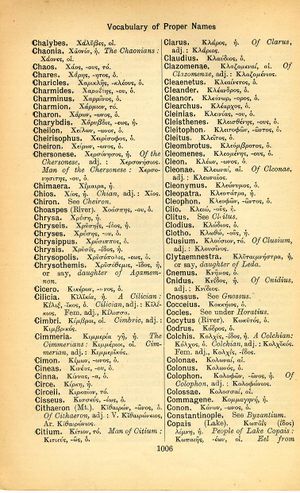Conon: Difference between revisions
From LSJ
Οὐκ ἔστι σιγᾶν αἰσχρόν, ἀλλ' εἰκῆ λαλεῖν → Silere non est turpe, sed frustra loqui → nicht Schweigen schändet, sondern Schwätzen auf gut Glück
(D_2) |
(Gf-D_2) |
||
| Line 1: | Line 1: | ||
{{WoodhouseENELnames | {{WoodhouseENELnames | ||
|Text=[[File:woodhouse_1006.jpg|thumb|link= | |Text=[[File:woodhouse_1006.jpg|thumb | ||
|link={{filepath:woodhouse_1006.jpg}}]]Κόνων, -ωνος, ὁ. | |||
}} | }} | ||
{{Lewis | {{Lewis | ||
Revision as of 07:31, 14 August 2017
English > Greek (Woodhouse)
Κόνων, -ωνος, ὁ.
Latin > English (Lewis & Short)
Cŏnōn: ōnis (Gr. acc. Conona, Just. 6, 1), m., = Κόνων.
I A renowned general of the Athenians, whose life was written by Nepos; cf. Cic. Off. 1, 32, 116; id. de Or. 3, 34, 139; Just. 5, 5 sq.; 6, 1 sqq.—
II A celebrated mathematician and astronomer of Samos in the time of Ptolemy Philadelphus, Cat. 66, 7; Verg. E. 3, 40; Sen. Q. N. 7, 3, 2; Serv. ad Verg. A. 7, 738.
Latin > French (Gaffiot 2016)
Cŏnōn,¹² ōnis, m.,
1 général athénien : Nep. Con.
2 astronome grec : Catul. 66, 7 ; Virg. B. 3, 40.

